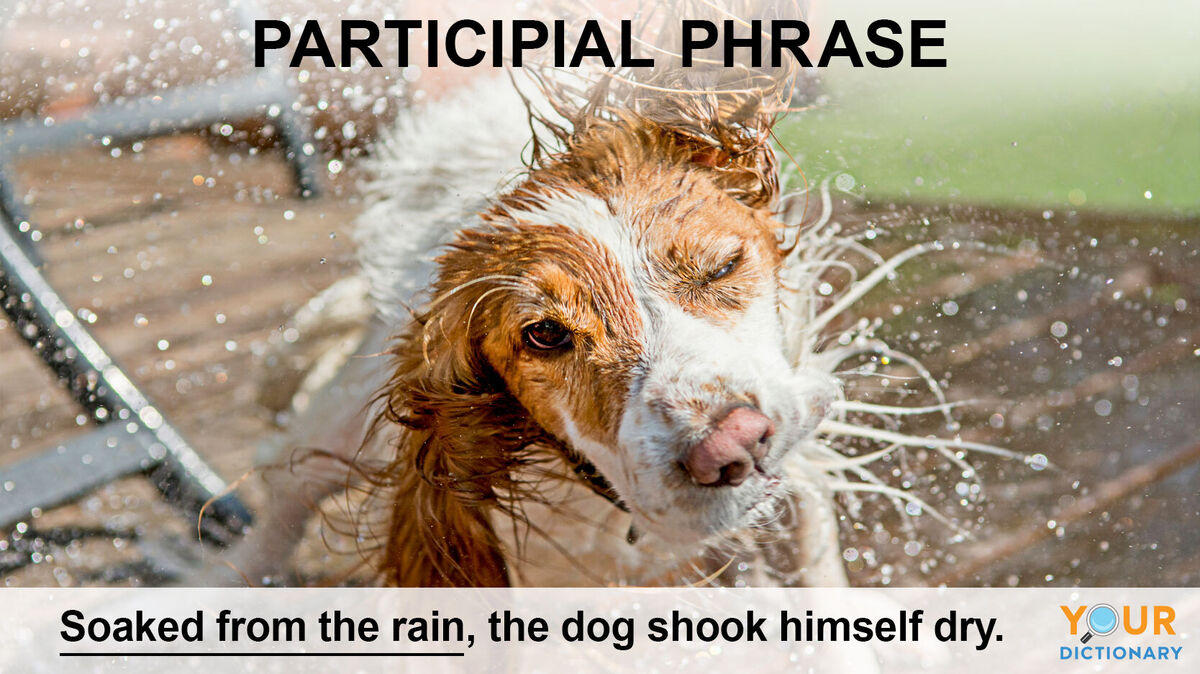
Do you ever get your verbals mixed up? It's hard to tell the difference between gerunds, infinitives and participles, but once you identify how they're used, you'll figure it out in no time. Learn more about participles — and the participial phrases formed with multiple words — with these explanations and examples.
What Is a Participial Phrase?
A participle is a verb that functions as a modifier. Participles provide further information about the noun or nouns in a sentence, just like an adjective or adverb.
Some basic participles include:
- The running dog crashed into the wall.
- The crying baby kept her parents up all night.
- Jack watched the sleeping giant as he crept by.
Running, crying and sleeping are all verbs. However, they are not functioning as verbs in these sentences; they are functioning as adjectives. When you add words to these participles, you're making participial phrases.
Som participial phrase examples include:
- Running at high speed, the dog crashed into the wall.
- The baby, crying loudly and continuously, kept her parents up all night.
- Jack watched the giant, sleeping soundly, as he crept by.
When participial phrases are separated from the sentence by a comma, they are non-essential. That means the sentence still makes sense if you remove the participial phrases. However, they do add important information that gives the reader a better idea of what is happening. "The dog crashed into the wall" is a grammatically correct sentence, but it helps the reader to know that the dog was running at a high speed.
Types of Participial Phrases
You'll see two main types of participles in participial phrases: present participles and past participles. These phrases sometimes come after linking verbs in different kinds of sentences. It's easy to tell the difference if you know how to tell your verb tenses apart!
Present Participial Phrases
Participles that end in -ing are present participial phrases. These phrases describe a condition that is happening at the same time as the action in the sentence, no matter what tense the rest of the sentence is in.
- Sitting in the rocking chair, the old woman yelled at the kids in her yard.
- I opened the mail, shaking with excitement.
- Wearing a hard hat and boots, Priscilla crossed the construction site.
- Ethan closed his eyes, feeling the wind sweep through his hair.
Past Participial Phrases
Past participial phrases include participles in the past tense. This includes verbs that end in -ed as well as irregular verbs in the past tense. They describe conditions that happened before the action in the sentence.
- Confused by the homework assignment, I emailed my professor.
- The police worked to locate the car stolen from my neighbor's driveway.
- I collected all the flowers cut by the gardener.
- Soaked from the rain, the dog shook himself dry.
Past participial phrases that start with the word "having" are known as perfect participial phrases. They describe an action that has already finished.
- Having worked all day, Lila decided to stay home and relax.
- Mr. Saunders understood a lot about the case, having spoken to the defendant a number of times.
- Having finished my dinner, I'm ready to try that chocolate cake.
- My mom saw my point of view having met the neighbors for herself.
Participial Phrases vs. Gerund Phrases
Gerund phrases are another type of verbal phrase that uses -ing verbs. But in gerund phrases, the phrase that starts with an -ing verb functions as a noun, not as an adjective.
- Participial Phrase - Hopping through the forest, the rabbit noticed a new watering hole. ("Hopping through the forest" describes the rabbit.)
- Gerund Phrase - The rabbit loved hopping through the forest. ("Hopping through the forest" is a noun — the direct object of the verb "loved.")
- Participial Phrase - I watched the little girl playing with her jump rope. ("Playing with her jump rope" describes the girl.)
- Gerund Phrase - Playing with her jump rope was the little girl's favorite thing to do. ("Playing with her jump rope is a noun — the subject of the sentence.)
- Participial Phrase - Somersaulting through the leaves, the baby panda bear exhibited pure bliss. ("Somersaulting through the leaves" describes the panda.)
- Gerund Phrase - The baby panda bear practiced somersaulting through the leaves. ("Somersaulting through the leaves" is a noun — the object of the verb "practiced.")
Unlike participial phrases, which can include past and perfect participles, gerund phrases only appear in present progressive words that end in -ing. If you can replace the phrase with another noun, such as "baseball" or "gymnastics," it's probably a gerund phrase. If not, you're likely looking at a participial phrase.
Pad Your Nouns with Participial Phrases
Using participial phrases can make your sentences more interesting and informative. Readers enjoy knowing more about what's happening in a sentence, and any additional modifiers you can provide are helpful. But be careful about where you put those participial phrases, and don't leave them as dangling modifiers! Learn more about dangling (and misplaced) modifiers to avoid this common (and preventable) grammar mistake.